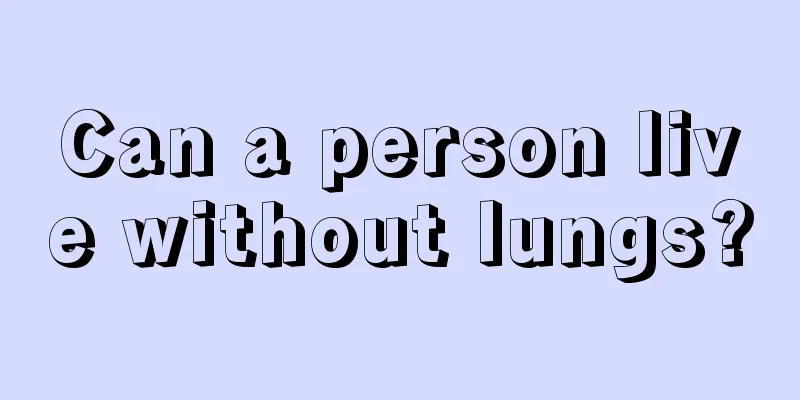Can a person live without lungs?

|
Our human body has many organs, and each organ has a unique function. For example, our heart is the basis of human life. If the heart stops beating, the person will die. Our lungs are the organs for respiratory conversion, where oxygen and carbon dioxide are exchanged. Generally, one lung will be retained during resection surgery, otherwise we will not be able to breathe. This article introduces the main functions of the lungs. If you are interested, let’s take a look. People have two lungs, and some people have their entire lung removed. But one needs to be kept. The lungs are an important place for the exchange of oxygen and carbon dioxide in the human body. Without lungs, people cannot breathe. If you can't breathe, you will suffocate to death The lungs play a very important role in the human body's organs, and their main function is breathing. Because the lungs are the place for gas exchange, it is through the breathing function of the lungs that we can continuously inhale and expel foul air to maintain life activities. 1. Main Qi controls breathing The lungs control qi, which was first seen in the "Inner Canon of the Yellow Emperor". "Suwen. The Formation of the Five Internal Organs" says: "All kinds of qi belong to the lungs." The lung controls qi, including the qi of breathing and the qi of the whole body. (1) The lungs control the flow of breath: The lungs control the flow of breath, which means that the lungs are the place for gas exchange. As stated in Suwen Yin Yang Ying Xiang Da Lun, "The weather passes through the lungs." Through the respiratory function of the lungs, fresh air is continuously inhaled and turbid air is expelled, expelling the old and taking in the new, thus achieving gas exchange between the body and the external environment to maintain human life activities. The lung's function of controlling breathing is actually the specific manifestation of the lung's function of spreading and descending in the gas exchange process: when the lung's qi spreads, turbid air can be exhaled; when the lung's qi descends, fresh air can be inhaled. When the lung qi's spreading and descending functions are coordinated and orderly, breathing will be even and unobstructed. Lung-Qi failure to spread or lung-Qi failure to descend will both result in abnormal breathing clinically, but the clinical manifestations are different. If it is caused by external infection, which triggers internal fluid and blocks the airway, causing the lung qi to fail to circulate, it often causes chest tightness, shortness of breath, or asthma. If it is caused by liver fire ascending, which consumes lung yin and causes the lung to fail to descend, it often causes wheezing, coughing, and breath reversal. (2) Controlling the Qi of the whole body: The lungs control the Qi of the whole body, which means that the lungs are responsible for the generation and circulation of the Qi of the whole body. Therefore, it is said in Suwen Liujie Zangxiang Lun that "the lungs are the root of qi." 2. Main water flow The lungs are responsible for the circulation of water, which means that the lung's function of dispersing and descending qi promotes and regulates the distribution and excretion of water throughout the body. "Suwen·Discussion on the Meridians" calls it "regulating the water channels." The connotation of the lung's function of transporting water has two main aspects: First, through the function of the lung Qi, the spleen Qi is transferred to the lung's water and the lighter and clearer parts of the essence of water and grain, which are dispersed upward and outward to the orifices of the head and face, and to the skin, fur, and muscles of the whole body to moisten them; the water transported to the skin, fur, and muscles is transformed into sweat under the promotion of the Wei Qi, and is excreted from the body in a controlled manner under the regulation of the Wei Qi. Secondly, through the descending function of the lung qi, the spleen qi is transferred to the thicker parts of the water and essence of water and grain in the lung, and transported inward and downward to other internal organs to moisten them, and the turbid liquid (waste water) produced by the metabolism of the internal organs is transported downward to the kidney (or bladder), which becomes the source of urine production. 3. To treat all meridians and treat joints The lungs are connected to all the meridians, which means that all the blood in the body flows through the lungs through all the meridians. Through the lungs' breathing, the clear and turbid air inside and outside the body are exchanged, and then the blood rich in clear air is transported to the whole body through all the meridians through the lungs' function of ascending and descending qi. All the blood vessels in the body belong to the heart, and heart qi is the basic driving force of blood circulation. The circulation of blood depends on the promotion and regulation of lung qi, that is, lung qi has the function of helping the heart to circulate blood. The lungs regulate the body's qi through breathing movements, thereby promoting blood circulation. Therefore, "Suwen·On the Normal Person's Qi and Weather" says: "When a person exhales, the pulse moves again, and when he inhales, the pulse also moves again." "Nanjing·Yin Nan" says: "When a person exhales, the pulse moves three inches, and when he inhales, the pulse moves three inches." At the same time, the natural fresh air inhaled by the lungs combines with the grain qi transformed from the essence of water and grain transported by the spleen and stomach to generate Zong Qi, which has the function of "penetrating the heart meridian" to promote blood circulation. When the lung qi is abundant, the zong qi is vigorous, and the qi flow is smooth, the blood circulation will be normal. If the lung qi is weak or congested and cannot help the heart circulate blood, it can lead to poor circulation of heart blood and even blood stasis, resulting in symptoms such as palpitations, chest tightness, blue lips and purple tongue. Conversely, if the heart qi is weak or the heart yang is weak, poor circulation of heart blood can also affect the circulation of lung qi, resulting in symptoms such as coughing and asthma. |
<<: Can kidney yin deficiency be treated with moxibustion?
>>: Postoperative complications of pyloric stenosis
Recommend
How to relieve the symptoms of tea drunkenness
Everyone knows that you will get drunk after drin...
Irregular treatment leads to a sharp increase in lung cancer patients
Why is lung cancer a disease with such a high mor...
What are some good ways to get rid of acne marks?
Everyone wants to get rid of acne scars, but few ...
Ingredients of Dettol Disinfectant
Many people don't know what Dettol disinfectan...
How to clean suede shoes
Leather shoes are very common. This type of shoes...
Is the smell from pharmaceutical factories harmful to the body?
A pharmaceutical factory refers to a production r...
What are the methods for correcting refractive error?
Refractive error refers to the phenomenon that wh...
Symptoms of too much turbid air in the body
In life, I believe many people have experienced g...
How to reduce fever with liquor
There are many ways people can reduce fever. For ...
The harm of tea stain
Tea is an indispensable part of our lives. Many p...
What are the causes of lung cancer? The occurrence of lung cancer is inseparable from these factors
In recent years, the reason why lung cancer is so...
Buttocks hurt after defecation
The pain in the buttocks after defecation is the ...
What are the symptoms of nicotine poisoning?
Do you know the symptoms of nicotine poisoning? T...
What medicine is good for bone growth after a fracture?
Fractures are ubiquitous in life and can occur du...
Why is sweat sticky
When people sweat, their bodies are eroded by swe...









